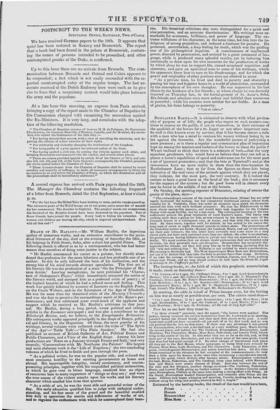DEATH op Mr. HAztarr.—Mr. William Hazlitt, the ingenious author of
numerous works, and an extensive contributor to the perio- dical literature of the day, died on the evening of Saturday the 18th, at his lodgings in Frith Street, Soho, after a short but painful illness. The following sketch is offered to us by a correspondent, who has had better means than ourselves of doing some justice to the subject.
"Mr Hazlitt commenced his career as a painter, but shortly aban- doned that profession for the more laborious and less profitable one of an author. In this he only followed the bent of his inclination, and the strong bias of his mind towards abstract speculation. The first act of his literary life was the production of a tract On the Principles of Hu- man Action.' Leaving metaphysics, he next published his Charac- ters of Shakspeare's Plays ;' which immediately attracted the notice of the literary world, and stamped him as a profound critic of poetry ; of the highest beauties of which he had a refined sense and feeling. This work was quickly followed by a course of Lectures on the English Poets, on the Comic Writers, and on the Literature of the Age of Elizabeth. lie was for some time the theatrical critic of the Morning Chronicle; and was the first to perceive the extraordinary merit of Mr. Kean's per- formances; and that celebrated actor owed much of the applause and support which he received to Mr. Hazlitt's criticisms in that jour- nal. Mr. Hazlitt, during a long period, wrote political and critical articles in the :Examiner newspaper ; and was also a contributor to the Edinburgh Review, and, we believe, to the Encyclopedia .13 ritannica. Bis subsequent works appeared principally in the shape of Essays, politi- cal and literary, in the Magazines. Of these, the most popular of his writings, several volumes were collected under the titles of The Spirit of the Age'—' Table Talk'—' The Plain Speaker,' He had also published an account of British Galleries of Art, Political Essays and Public Characters, and a View of the English Stage. Among his later productions are 'Notes on a Journey through France and Italy,' and very recently, Conversations with Mr. Northcote the Painter.' His largest and most elaborate work is the 'Life of Napoleon;' the two concluding volumes of which he lived to finish and pass through the press.
"As a political writer, he was on the popular side, and evinced the most strenuous. hostility to the existing governments at home and abroad. His incorruptible integrity, steady consistency, and uncom- promising principles, together with his unqualified political animosities, to which he gave vent in bitter language, rendered him, an object of rancorous hate to many supporters of things as they are ;' and were the true causes of the violent attacks upon his works and his literary -character which assailed him from that quarter.
"As a critic of art, he was the most able and powerful' writer of the day. His early education qualified him to judge with technical under- standing, and his fine- sense of the grand and the beautiful enabled him duly to appreciate the merits and deficiencies -of -works of art, and to regulate the enthusiasm with which he wintemplated their beau. ties. His theatrical criticisms also were distinguished for a quick and nice perception, and an accurate discrimination. His writings were re- markable for acuteness, brilliancy, and power of language. The ex- treme wilfulness of his character, at the same time, led him into the in- dulgence of strong prejudices, and induced a fondness for paradox. He possessed, nevertheleSs, a deep feeling for truth, which was the guiding star of his philosophical inquiries. A consciousness of intellectual power, directed by penetration, and assisted by a great command of Ian. guage, while it produced many splendid results, yet by inducing him continually to draw upon his own resources for the production of works by which alone be was to support life, caused occasional repetition and sameness, and gave an egotistical tone to some of his writings, which his opponents knew how to turn to his disadvantage, and for which the power and originality of other portions were not allowed to atone. "As a private man, he lived and died in poverty and obscurity ; passing his best and happiest hours in a world of abstraction, surrounded by the atmosphere of his own thoughts. He was supported in his last illness by the kindness of a few friends ; at whose charge he was decently interred on Thursday last, in the burial-ground of St. Anne's, Soho. His friends and admirers were more ardent and faithful than numerous or powerful ; while his enemies were neither few nor feeble. As a man of genius, his fame belongs to posterity.
" Vale et valete."


























 Previous page
Previous page